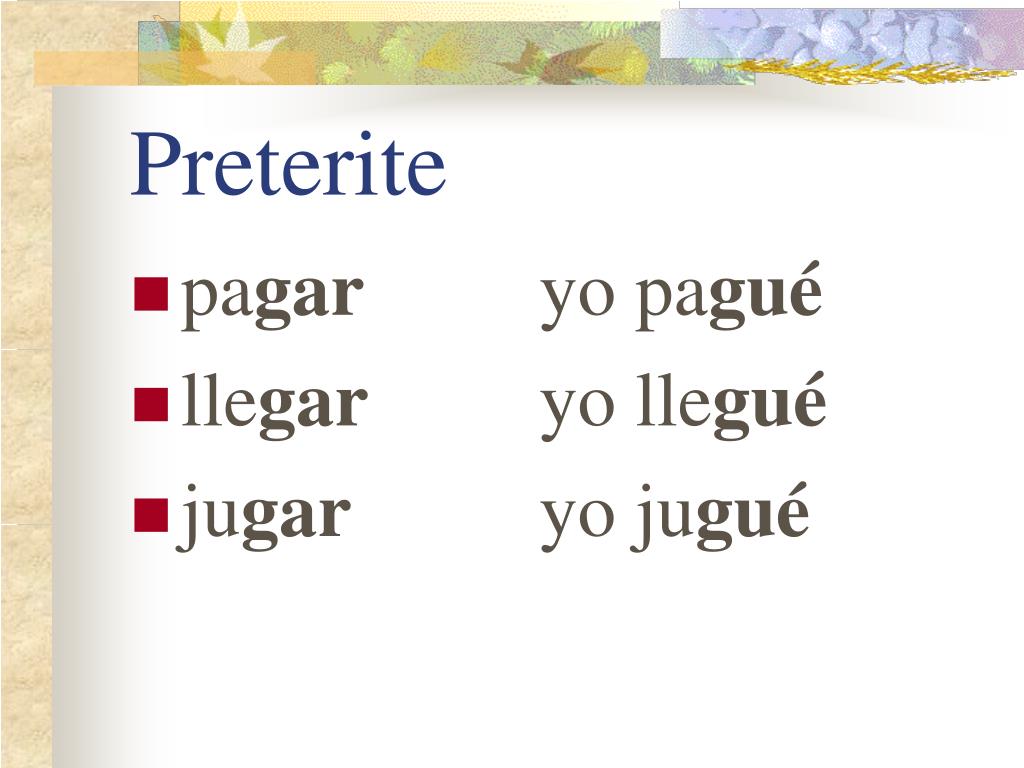

I was eating strawberries./I used to eat strawberries. I didn’t want to go to the shopping center. They already found out about the concert. I knew the president of the organization. PreteriteĬonocía al presidente de la organización. Notice how the meaning changes for these verbs in the preterite vs the imperfect. The rule of thumb for determining which tense to use is that the preterite talks about what you did, and the imperfect talks about what you were doing or what you used to do. Juana and Alberto were talking about the meeting when I got to the office. Juana y Alberto hablaban de la reunión cuando llegué a la oficina.

I was walking to the library when I met the love of my life. Here, the interrupted action uses the imperfect tense, while the interrupting action uses the preterite.Ĭaminaba a la biblioteca cuando me encontré con el amor de mi vida. These past tense forms are often used to talk about an ongoing action or event that was interrupted.
LLEGAR PRETERITE ENDINGS TRIAL
Ready to try us out? Sign up for your free trial class. Free lesson materials that you can take.Anxiety-free experience & ease of learning.With Homeschool Spanish Academy, get access to innovative, human-centered learning strategies and SPEAK SPANISH from your very first class. Lucky for you, there are also a bunch of words and phrases that tend to signal that a verb should be used in the imperfect! The imperfect form is typically used for: habitually repeated actions time and dates someone’s age in the past characteristics and mental or physical states. Perhaps they are yet to be completed or they refer to a general time in the past. On the other hand, you’ll be using the imperfect tense to talk about past actions without a definite end. Our teachers are eager to meet you! Sign up for your free trial class.
LLEGAR PRETERITE ENDINGS HOW TO
How to Use ‘Darse Cuenta’ in Spanish Conversation.Venir vs Llegar: They Don’t Mean the Same Thing.Hace (tres) días – (three) days ago Verbs that (Almost) Always Use the Preteriteįurthermore, verbs used to discuss events with a certain beginning and end are almost always used in the preterite. Let’s take a look at some of them!ĭurante (cinco) siglos – for (five) centuriesĭesde el primer momento – from the first moment Imperfect: Regular -er and -ir VerbsĬorrer (to run): corría, corrías, corría, corríamos, corríanĪbrir (to open): abría, abrías, abría, abríamos, abrían El Preterito Phrases that Trigger the PreteriteĪ handful of words and phrases indicate specific time frames that signal the use of the preterite (vs imperfect). So, hablar in this form becomes hablaba, hablabas, hablaba, hablábamos, hablaban. hablaron Preterite: Regular -er and -ir VerbsĬorrer (to run): corrí, corriste, corrió, corrimos, corrieronĪbrir (to open): abrí, abriste, abrió, abrimos, abrieron Imperfect: Regular -ar Verbs For example: hablar (to talk) becomes yo hablé, tú hablaste, él/ella/Ud.


 0 kommentar(er)
0 kommentar(er)
